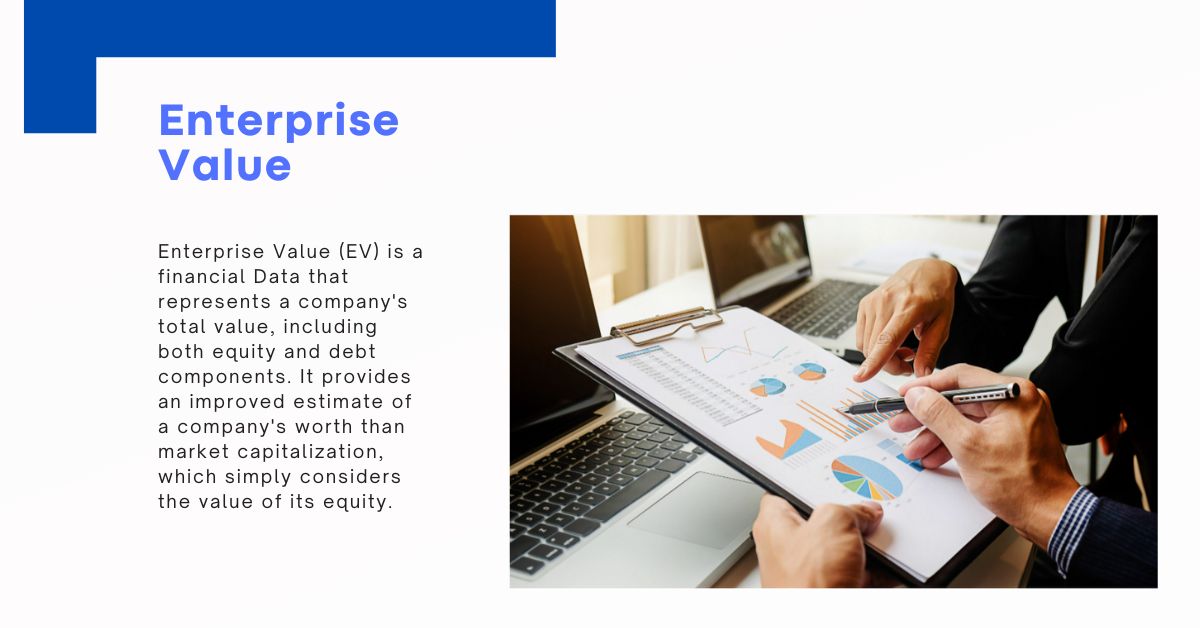Enterprise value (EV) is a type of corporate valuation that finance professionals commonly utilize in mergers and acquisitions (M&A). To calculate EV, add a company’s market capitalization (the value of its publicly traded shares) and total debt, then deduct its highly liquid assets, such as cash and savings.
What is Enterprise Value?

Enterprise Value (EV) is financial Data that represents a company’s total value, including both equity and debt components. It provides an improved estimate of a company’s worth than market capitalization, which simply considers the value of its equity.
EV is calculated by adding a company’s equity market value to its total debt, then deducting cash and cash equivalents. This is effectively the sum a potential buyer would have to pay to acquire the complete company, including its assets and liabilities.
EV is a useful tool for investors and analysts since it enables more precise comparisons of companies with different capital structures. It is widely utilized in a variety of financial analysis, including valuation multiples and mergers & acquisitions.
Enterprise Value Formula
Enterprise Value (EV) Formula:
EV = Market Capitalization + Total Debt – Cash & Cash Equivalents
Where:
- Market Capitalization: The total market value of a company’s outstanding shares.
- Total Debt: The total amount of debt, including both short-term and long-term liabilities.
- Cash & Cash Equivalents: The total amount of cash and highly liquid investments.
This formula essentially determines the overall cost of acquiring a company, taking into account both the stock and loan components.
Why is Enterprise Value Used?
Enterprise Value (EV) is utilized for a variety of reasons.
- Valuation Comparison: EV enables more accurate comparisons of enterprises with varying capital structures. Market capitalization alone can be misleading because it only represents the value of equity. EV takes into account both equity and debt, giving a more complete picture.
- Mergers and Acquisitions: EV is an important measure in merger and acquisition (M&A) transactions. It aids in the determination of a target company’s fair value and improves buyer-seller discussions.
- Financial Analysis: EV is used in a variety of financial analysis, including valuation multiples (EV/EBITDA, EV/Sales) and debt-to-equity ratios. It gives essential information on a company’s financial health and performance.
- Capital Structure Analysis: EV can be used for assessing a company’s capital structure and determining whether it is well-financed. A high EV relative to market capitalization indicates more debt financing.
- Investor Decision-Making: EV is an important indicator that investors use to assess a company’s total value and desirability. Understanding the EV allows investors to make more educated judgments about investing in or divesting from a specific company.
Who Uses Enterprise Value?
A wide range of people and businesses involved in financial research and decision-making use enterprise value (EV) data. Some of the key consumers of electric vehicles are:
- Investors: Individual and institutional investors use EV to judge a company’s entire value and compare it to other possible investments.
- Experts: Financial experts, such as equities and credit analysts, utilize EV in their research and reports to assess companies’ financial performance and attractiveness.
- Corporate executives utilize EV to analyze their own company’s value, research potential acquisition prospects, and make capital structure decisions.
- Investment bankers use EV in mergers and acquisitions to calculate a target company’s fair value and negotiate transactions.
- Lenders: Banks and bondholders use EV to figure out a company’s creditworthiness and decide the right level of debt funding.
- Government Agencies: Government agencies, particularly those concerned in regulation and taxation, may utilize EV as data for a variety of purposes, including analyzing the financial health of industries and calculating tax liabilities.
Why Does This Matter for Your Business?
Enterprise Value (EV) is a significant number for firms for a variety of reasons.
- Valuation is a complete estimate of a company’s value that includes both stock and debt components. This is critical for determining the company’s market value and making sound judgments about mergers, acquisitions, and capital raising.
- Financial Analysis: EV is used for a variety of financial analysis, including valuation multiples and debt-to-equity ratios. Such evaluations enable firms to examine their financial health, compare themselves to industry peers, and discover opportunities for development.
- Investor interactions: Understanding EV is critical to effective investor interactions. Businesses that communicate their EV to investors can present a more complete picture of their value and attract new investors.
- Capital Structure Optimization: EV can assist organizations in assessing their capital structure and determining whether they are optimally financed. Companies can make informed finance decisions by understanding the equity-to-debt ratio.
- Strategic Planning: EV can serve as a baseline for setting strategic goals and tracking progress. Businesses can analyze the effectiveness of their growth and profitability initiatives by measuring changes in electric vehicles (EV) over time.
Enterprise Value vs Equity Value
| Feature | Enterprise Value | Equity Value |
|---|---|---|
| Definition | The total market value of a company’s assets, including both debt and equity. | The market value of a company’s common stock. |
| Formula | Enterprise Value = Market Capitalization + Net Debt + Preferred Stock + Minority Interest | Equity Value = Market Capitalization |
| Components | Market capitalization, debt, preferred stock, minority interest | Market capitalization only |
| Use Cases | Valuing a company for acquisition or merger, comparing companies across industries | Valuing a company’s common stock, assessing shareholder returns |
| Perspective | Represents the total cost of acquiring the entire company. | Represents the value of the equity portion of the company. |
Enterprise Value vs Market Cap
| Feature | Enterprise Value (EV) | Market Capitalization (Market Cap) |
|---|---|---|
| Definition | The total market value of a company’s assets, including both debt and equity. | The total market value of a company’s common stock. |
| Formula | EV = Market Cap + Net Debt + Preferred Stock + Minority Interest | Market Cap = Share Price * Number of Shares Outstanding |
| Components | Market capitalization, debt, preferred stock, minority interest | Market capitalization only |
| Use Cases | Valuing a company for acquisition or merger, comparing companies across industries | Assessing the value of a company’s common stock, measuring shareholder returns |
| Perspective | Represents the total cost of acquiring the entire company. | Represents the value of the equity portion of the company. |
Can Enterprise Value Be Less Than Equity Value?
Yes, enterprise value (EV) might be lower than equity value (EV). This usually happens when a corporation has a large amount of cash or other liquid assets that surpass its entire debt. In such instances, the net debt component of the EV calculation (EV = Market Cap + Net Debt + Preferred Stock + Minority Interest) becomes negative, thus lowering the EV below its market capitalization.
For example, if a corporation has a market capitalization of $100 million, $20 million in debt, and $30 million in cash, its net debt would be -10 million dollars. Thus, the EV would be $100 million plus (-$10 million) = $90 million, which is less than the Equity Value.

